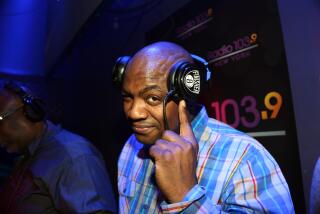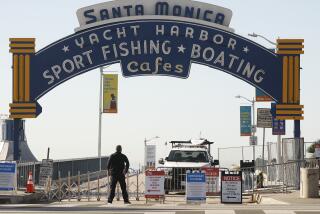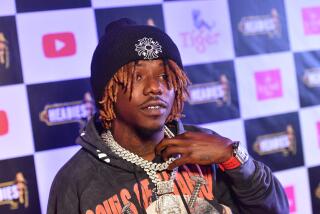Gangsta rap performer Notorious B.I.G. slain
Rap music star Notorious B.I.G. was shot to death along Museum Row in Los Angeles’ Mid-Wilshire district early Sunday as he left a music industry party, a brazen attack that marked the second drive-by murder of a gangsta rap celebrity in the last six months.
B.I.G., born Christopher Wallace, was leaving the party at the Petersen Automotive Museum about 12:30 a.m. when police believe someone in a dark car pulled up alongside the passenger side of the GMC Suburban in which he was riding and fired several shots inside.
The 24-year-old rapper, who had earned rave reviews and big sales in giving voice to the violent edge of the streets, was declared dead at Cedars-Sinai Medical Center at 1:15 a.m. His body was identified Sunday afternoon at the Los Angeles coroner’s office by his ex-wife, singer Faith Evans, and his mother, who flew in from New York, officials said.
Although more than 1,000 people were said to be at the party, police said they had few eyewitnesses and even fewer solid leads to the shooting at the intersection of Fairfax Avenue and Wilshire Boulevard.
At the time of the shooting, hundreds of industry executives and musicians were pouring out of the Petersen museum after organizers decided to shut the party down, apparently because of the overflow crowd, according to police. Many of the guests fled in panic as the shots rang out.
Some detectives are worried about a repeat of the stalled investigation into the murder of Tupac Shakur. That rap star--a rival to Wallace--was fatally shot on the busy Las Vegas Strip in September, but police there have complained that witnesses refused to cooperate. The Shakur case remains unsolved.
Detectives said they are investigating whether Wallace’s death is linked to bicoastal tensions within the rap world, but had nothing solid to go on. Other theories are being pursued as well.
*
Los Angeles Police Department spokesman Jason Lee said: “We’re not ruling out anything at this time. . . . It could be anything. It could be a gang, it could be ties to something, it could be a random shooting. We don’t know.”
LAPD Det. Raymond Futami said he suspects that witnesses in the Wallace case are afraid to talk.
“It’s frustrating,” said Futami, one of nearly a dozen detectives on the case. “I think there’s a lot of people who are not coming forward. I’m sure there’s a little bit of an intimidation factor . . . because of the reputation of some of the people who are involved in this case.”
Wallace, a 6-foot-3 man who weighed 380 pounds and also went by the name Biggie Smalls, lived in New Jersey and was in Los Angeles to record music and to attend Friday night’s Soul Train Music Awards and related festivities. His next album was scheduled to come out in two weeks. Its title now seems grimly ironic: “Life After Death . . . ‘Til Death Do Us Part.”
Wallace had said in an interview with The Times last week that his injuries in a car accident a few months ago had convinced him to “slow down . . . and think about what you’re gonna do with the rest of your life.” But he remained stoic about his future, saying he had stopped believing that his stature in the rap industry could insulate him from its volatility.
“There’s nothing that protects you from the inevitable. If it’s going to happen, it’s going to happen, no matter what you do,” he said. “It doesn’t matter if you clean up your life and present yourself differently, what goes around comes around, man. It’s crazy for me to even think . . . that a rapper can’t get killed just because he raps. I’m stupid for even thinking that it couldn’t.”
An ex-crack dealer from Brooklyn who had several brushes with the law, Wallace often found himself at the center of speculation about a cross-continent feud between himself and West Coast rap players such as Shakur and industry mogul Marion “Suge” Knight. Last year at the awards show, Wallace’s bodyguard brandished a weapon and got into a scuffle with an armed member of Shakur’s entourage outside Shrine Auditorium.
Capping off this week’s activities was the Saturday night party at the Petersen for artists and music executives, including many from the rap and R&B set who had attended the awards show. The party was thrown by Vibe Magazine and Qwest Records--both founded and operated by Quincy Jones--and by Tanqueray Gin, police said.
Jones, a 40-year entertainment industry veteran, could not be reached for comment Sunday. His daughter Kidada, who was engaged to rapper Tupac Shakur and was with him the night he was gunned down, attended the party Saturday.
Selwyn Seyfu Hinds, editor-in-chief of The Source Magazine, the rap industry’s leading publication, talked with Wallace for a few minutes at the party. “We just did a cover article on him and he wasn’t crazy about the cover,” he said.
Hinds said he and others from his magazine left the party and were just outside the museum at a red light at Wilshire and Fairfax--the intersection where police said the shooting took place--when he heard a series of shots.
“It sounded like it was at least 10,” he said. “When we heard the shots, we looked up and saw what looked like a big black Jeep. The doors started popping open on the Jeep and it became bedlam, a frantic circle of activity. I saw a guy holding his hands to his face. I couldn’t see if the guys around the car had just rolled on the Jeep or they were from inside the car.”
Not knowing if the shots would continue, Hinds said he sped off, thinking little of the incident until hours later. Early Sunday morning, his pager began going off and he learned of the shooting. “I was stunned and shocked,” he said. It “seemed like Biggie was in such a good mood when I saw him. The whole vibe this weekend after the Soul Train Awards was so peaceful.”
Dozens of concerned friends and fans gathered in the hospital parking lot early Sunday. Wallace’s sport utility vehicle, riddled with at least five bullet holes, remained in view there until detectives impounded it.
At hip-hop radio stations, record shops and other venues in Los Angeles that had embraced Wallace’s music, his death was met with both shock and anger Sunday, as fans deplored the loss of two of the industry’s biggest talents.
*
“People have been calling me up crying. . . . Every phone call is someone crying,” said Russell Simmons, CEO of Def Jam Music Group and Rush Communications, who was sitting at a table with Wallace just hours before he was shot.
At Tempo Records on Hoover Street across from USC, the shop doubled its order for Notorious B.I.G.’s March 25 album release to meet an expected rush.
“We did the same thing when Miles Davis and Tupac died,” said manager Raymon Comeaux. “Whenever an artist dies, we’ve got to pack the shelves.”
Police pursued initial reports that the gunman was riding in a black utility vehicle and, about two hours after the shooting, stopped a man in the area whose vehicle fit that description, Futami said. The man had a gun, and police booked him on suspicion of firing it into the air shortly after the slaying--but they do not consider him a suspect in the killing, he said. Based on other witnesses’ accounts, police now believe the assailant’s vehicle was a dark full-sized car, not a truck or sport-utility vehicle, he said.
“We can safely say it was a male black who did the shooting,” Futami said. He declined to say whether the gunman was alone in the vehicle.
Wallace’s slaying triggered instant debate in the rap community over whether he may have been the latest victim of a bicoastal rap feud, possibly linked to Shakur’s death.
Wallace was considered a rival of Shakur, who had accused him of involvement in a November 1994 robbery in which Shakur was shot several times and lost $40,000 in jewelry. Wallace denied having anything to do with that crime and few in the rap community except Shakur believed that he did.
Shakur escalated his verbal attacks in 1995 after joining Death Row Records, regularly ridiculing both Wallace and Sean “Puffy” Combs, the owner of Bad Boy Entertainment, the New York label for which Wallace recorded. Shakur even wrote a song about his hatred for East Coast rappers in which he taunted Wallace, calling him a “fat mother ------” and claimed that he had sex with Wallace’s wife.
But sources close to Bad Boy and Death Row dismissed speculation that Wallace’s slaying was an act of retaliation.
“It’s ludicrous for anyone out there to blame Death Row,” said Norris Anderson, who took over as general manager of Death Row after Knight was jailed on a probation violation in October. “We do not condone this kind of activity, and Death Row certainly had nothing to do with it. Snoop and Biggie and Puffy have been in the press recently trying to quash all this media madness.”
“This is a terrible tragedy,” Anderson said. “I got woke up with the news at 5 a.m. this morning and I am still blown away. Death Row knows how bad something like this can feel. It happened in our own backyard with Tupac just a few months ago. My condolences go out to Biggie’s family. I feel horrible for them. This killing has to stop.”
Contributing to this story were Times staff writers John M. Gonzales and Frank B. Williams.
More to Read
Start your day right
Sign up for Essential California for news, features and recommendations from the L.A. Times and beyond in your inbox six days a week.
You may occasionally receive promotional content from the Los Angeles Times.






